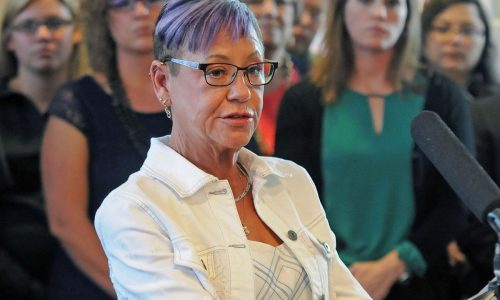More than $2 million from a California billionaire has been dropped into a North Dakota ballot measure aimed at elevating crime victims’ rights to the constitutional level. Only $10,000 has been raised by opponents to Marsy’s Law.
The Marsy’s Law for North Dakota committee’s pre-general election finance report filed Friday though the Secretary of State’s office showed Henry Nicholas donating $2,002,803 to efforts to pass Measure 3. This is in addition to $488,874 he provided last year, when the measure was still being drafted.
Measure 3 would amend the state’s constitution to place crime victims’ rights on the same level as the accused, rather than just in statute.
Nicholas’ efforts to pass Marsy’s Law came following the death of Marsalee “Marsy” Nicholas, who was stalked and killed by her ex-boyfriend in California in 1983. So far, the law has passed in California and Illinois.
“Dr. Nicholas is doing this to give back,” Marsy’s Law for North Dakota spokeswoman Lacee Anderson said of the sum he’s put into Measure 3. “He doesn’t want anyone else to deal with that.”
The North Dakota language includes provisions allowing for notification of hearings in the judicial process and notification if the accused person escapes custody. It also calls for taking victims and their family’s welfare into consideration when setting bail for the criminals.
Fewer dollars for opposition efforts
An opposition group called “No on 3 North Dakota” that was launched last month reported $10,000 in contributions. Two groups that are part of the coalition, the Council on Abused Women’s Services North Dakota and the North Dakota Women’s Network, were among those that donated to the effort.
“The people of North Dakota are not stupid. He’s not going to be able to buy a constitutional amendment in North Dakota,” said Wefald, adding that the opposition coalition has the truth and the people on its side. He said efforts to educate the public on Measure 3 will continue.
Anderson said the dollars from Nicholas have gone into television and radio advertising as well as staff for the campaign and travel across the state to get the Measure 3 message out.
“We’re just continuing to try to share the stories of the victims,” Anderson said. “It’s just disappointing that the opponents continue to focus on the wrong things.”
Opponents have had a number of concerns with Measure 3, calling it a broad unfunded mandate that could divert resources away from existing programs and services to victims. Opponents believe the measure would add an extra layer of work to law enforcement in providing notices to every victim of every crime. Wefald said it will also create an additional layer of work for defense attorneys and prosecutors.
Another major concern is over measure language allowing victims to refuse an interview and deposition.
A fiscal note prepared by the Office of Management and Budget was released to lawmakers last month. The fiscal impact for the remainder of the 2015-17 biennium if Measure 3 is passed was estimated at $1,156,846 and the fiscal impact for the 2017-19 biennium at $3,966,330.

